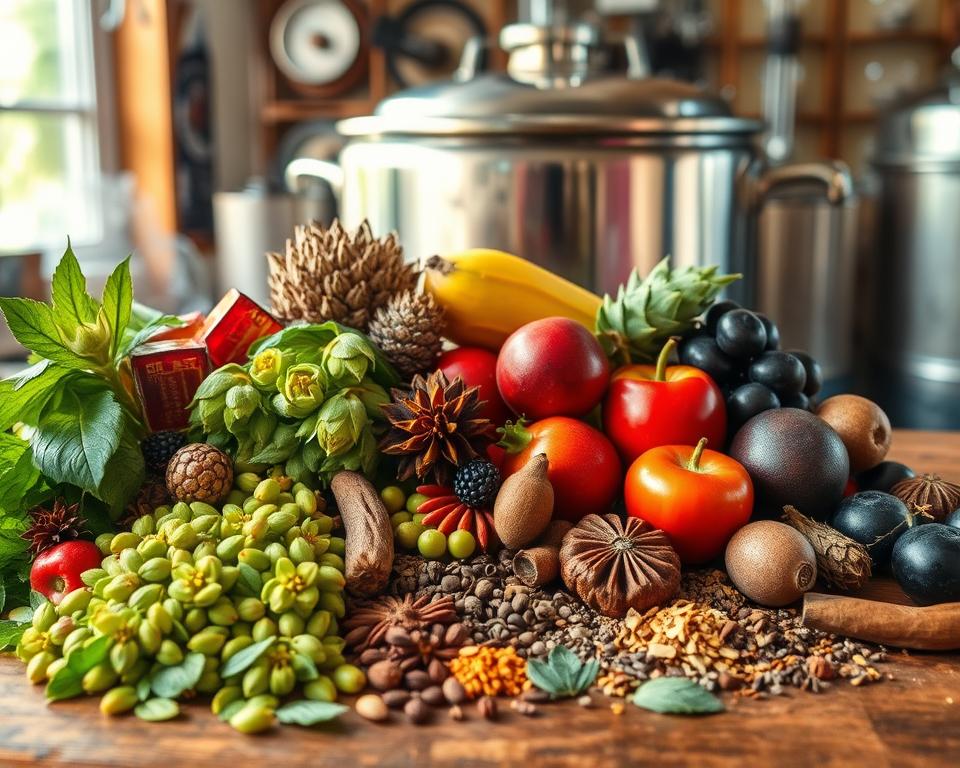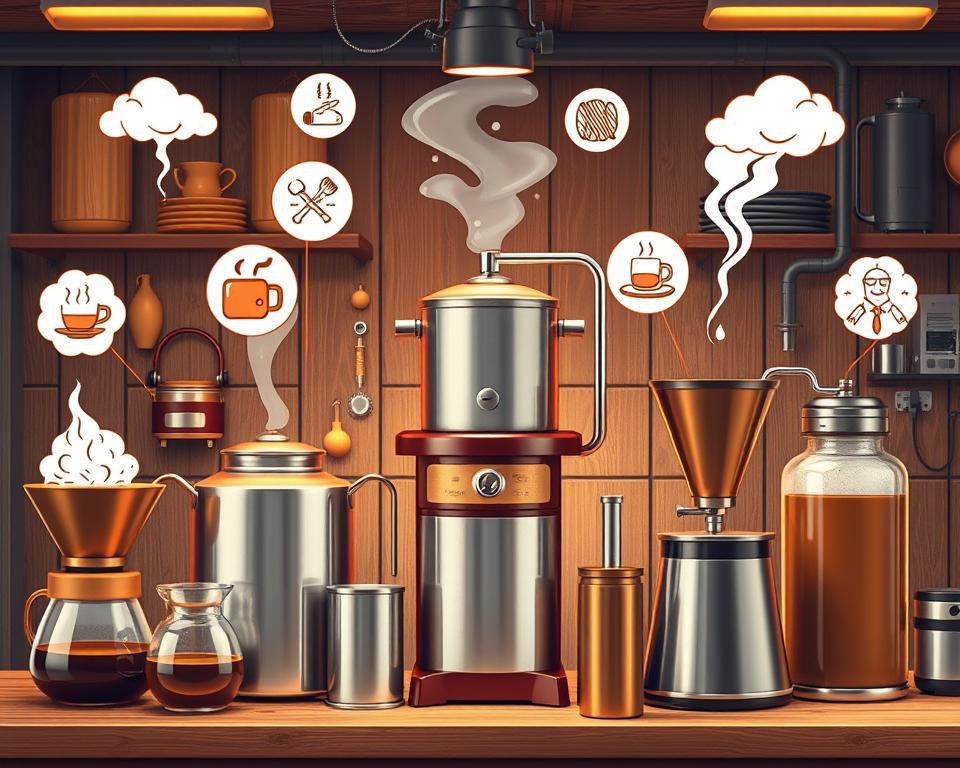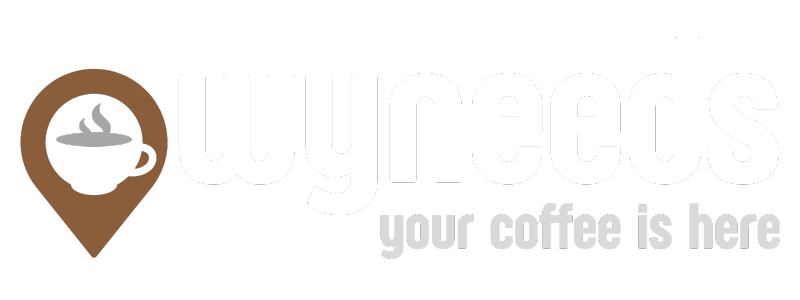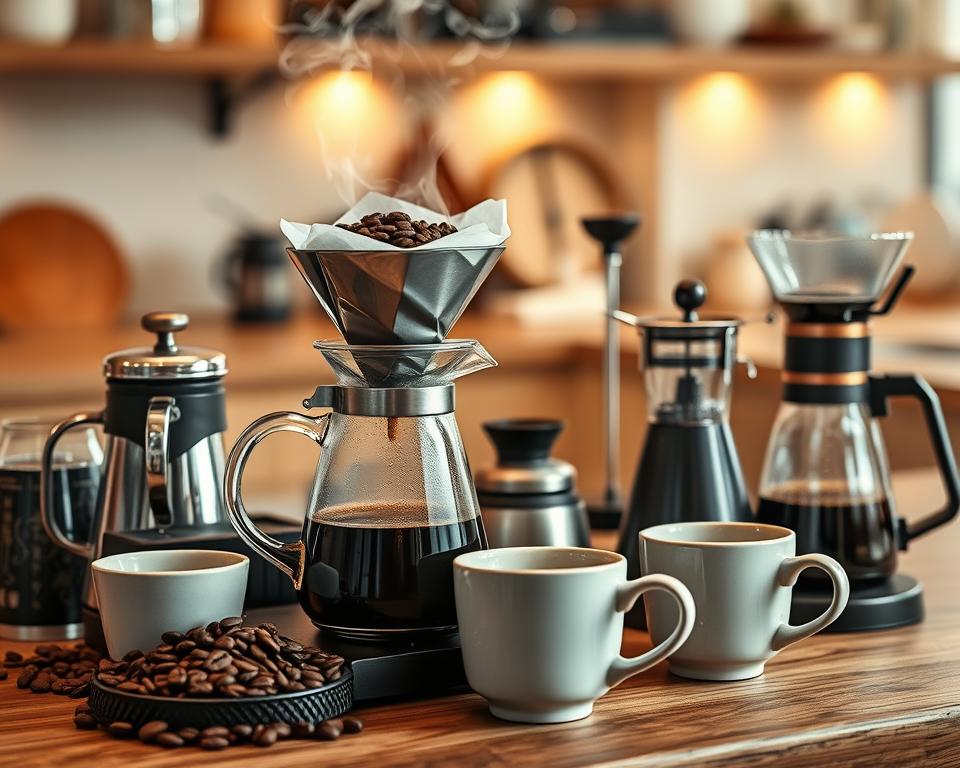To elevate your beverage game, understanding the factors that influence flavor and quality in coffee brewing is key. Mastering brewing techniques and best practices unlocks the full potential of your coffee. For expert-approved brewing techniques, visit coffee brewing methods to learn more about the art of brewing.
Coffee brewing requires a deep understanding of techniques, including the optimal water temperature. This should be between 195°F to 205°F (90°C to 96°C). The right coffee-to-water ratio is also crucial. With the right techniques and equipment, you can craft exceptional drinks and enjoy a perfect cup every time.
Key Takeaways
- Mastering brewing techniques is crucial for coffee enthusiasts to elevate their beverage game.
- Optimal water temperature for brewing coffee is between 195°F to 205°F (90°C to 96°C).
- Coffee-to-water ratio and grind size play a significant role in the extraction rate and flavor of the coffee.
- Regular maintenance of espresso machines is necessary for optimal performance and extraction quality.
- Documenting coffee characteristics in a tasting journal can help improve brewing techniques and best practices.
- Serving coffee promptly is essential to preserve its flavor and quality.
- Exploring different coffee brewing methods, such as pour-over and cold brew, can help you find your perfect cup.
Understanding the Basics of Brewing
To elevate your home brewing game, it’s essential to understand the basics of brewing, including key ingredients and techniques. Home brewing tips often emphasize the importance of using the right coffee supplies and equipment. By grasping these fundamental concepts, you can set yourself up for success and start experimenting with different coffee brewing methods.
When it comes to brewing, water quality plays a significant role. The taste and quality of your beverage can be greatly affected by the water used in the brewing process. A brewing equipment guide can help you choose the right equipment to ensure the best results. Understanding the basics of brewing also helps you appreciate the importance of using fresh, high-quality ingredients.
- Temperature: Mashing temperatures typically range between 100°F (37.8°C) and 170°F (76.7°C).
- Time: The mashing process duration is generally between 1 to 2 hours.
- Ingredients: The four basic ingredients in beer are malted barley, yeast, water, and hops.
By mastering these basics, you can improve your brewing skills and experiment with different brewing techniques, such as cold brewing or nitro brewing, to create unique and delicious beverages.
| Ingredient | Importance |
|---|---|
| Malted Barley | Provides sugars for fermentation |
| Yeast | Converts sugars into alcohol |
| Water | Affects the taste and quality of the beverage |
| Hops | Contributes to flavor and bitterness |
Traditional Brewing Methods
Traditional brewing methods have been passed down through generations, each with its unique characteristics and requirements. Steeping, for example, involves soaking coffee grounds in hot water to extract flavors and oils. This method is commonly used in specialty coffee techniques, such as French press and tea brewing.
Expert brewing advice emphasizes the importance of water quality, temperature, and brewing time. Mastering these elements is crucial for producing high-quality beverages. Traditional methods, like boiling and fermentation, are still used today in making coffee, tea, and beer.
- Steeping: used in tea and coffee brewing
- Boiling: used in beer and soup production
- Fermentation: used in beer and wine production
To achieve high-quality results, brewers need expert brewing advice and a deep understanding of the brewing process. By combining traditional methods with modern technology and specialty coffee techniques, brewers can create unique and innovative beverages. This showcases their skills and expertise.
| Brewing Method | Description |
|---|---|
| Steeping | A traditional brewing method that involves soaking coffee grounds in hot water |
| Boiling | A traditional brewing method that involves boiling ingredients in water |
| Fermentation | A traditional brewing method that involves allowing ingredients to ferment in a controlled environment |
Innovative Brewing Techniques
Innovative brewing techniques are transforming the beverage industry, introducing unique flavors and textures. This evolution is driven by a commitment to continuous improvement in brewing. Enthusiasts can now explore new brewing methods, discovering their new favorites.
The rise of advanced brewing methods like cold brewing and nitro brewing is notable. These techniques offer more control over the brewing process, leading to superior products.
Cold Brewing: A Modern Twist
Cold brewing involves steeping coarse-ground coffee beans in cold water for 12-24 hours. This method yields a smooth, low-acidity coffee ideal for hot summer days.
Nitro Brewing: Adding a Creamy Texture
Nitro brewing infuses coffee with nitrogen gas, creating a creamy texture. It’s akin to cold brewing but uses higher pressure to inject nitrogen into the coffee.
Innovative brewing techniques bring several benefits:
- Unique flavors and textures
- Precise control over the brewing process
- Higher quality products
| Brewing Method | Description |
|---|---|
| Cold Brewing | Steeping coarse-ground coffee beans in cold water for 12-24 hours |
| Nitro Brewing | Infusing coffee with nitrogen gas to create a creamy texture |
By embracing innovative brewing techniques, brewers can offer a distinctive experience. This sets them apart from competitors, enhancing their appeal.
Exploring Different Types of Brewing Equipment
Having the right brewing equipment is crucial for the quality of your beverage. A brewing equipment guide can help you understand the various options. From essential tools for home brewers to advanced equipment for enthusiasts, the right gear is key. It ensures a perfect cup every time.
For home brewers, starting with a basic brewing kit is wise. These kits, ranging from 5-10 gallons, are affordable, starting at $500. They’re ideal for beginners. For those wanting to try different recipes, a pilot brewing system with 10-30 gallon capacities might be better. Commercial systems, with capacities from 1-100 barrels, are more expensive, ranging from $50,000 to over $500,000.
When choosing brewing equipment, consider the material and automation level. Advanced gear, like Ss BrewTech’s, can simplify brewing and improve consistency. Expert brewing advice is also crucial in selecting the right equipment. By following home brewing tips, you can create high-quality beverages, rivaling commercial ones.
Regular cleaning and maintenance of brewing equipment are vital. They prevent contamination and ensure optimal fermentation conditions. With the right equipment and practice, you can become a skilled brewer. Whether you’re new or experienced, investing in quality equipment and following home brewing tips will help you reach your brewing goals.
The Role of Temperature in Brewing
Temperature is key in brewing techniques, shaping the taste of the final product. Knowing the best brewing temperatures for various drinks is crucial. For example, the right fermentation temperature is essential for top-notch beer.
In coffee brewing methods, temperature control is also critical. The perfect brewing temperature for coffee ranges from 195°F to 205°F. Advanced brewing methods require precise temperature control to highlight the coffee beans’ unique flavors.
Here are some key factors to consider when it comes to temperature in brewing:
- Optimal brewing temperatures for different beverages
- How temperature affects flavor profiles
- The importance of temperature control in advanced brewing methods
By mastering temperature control, brewers can enhance their brewing techniques. This leads to a more enjoyable coffee or beer experience.
Flavoring Techniques in Brewing
Flavoring techniques can transform your coffee, adding depth and complexity. By exploring different methods, you can craft unique flavors that enhance your coffee experience. This experimentation can lead to a more enjoyable and satisfying brew.
Adding herbs and spices is a popular way to flavor coffee. Options like coriander, nutmeg, and cinnamon can add a rich, aromatic taste. Infusing coffee with fruits and flavors, such as tart cherry or orange, introduces a refreshing twist.
Specialty brewing methods, like cold and nitro brewing, also offer opportunities for unique flavors. Adding a splash of vanilla or hazelnut to cold brew can result in a creamy, indulgent taste. With the right techniques and advice, you can elevate your coffee to exceptional levels.

- Adding herbs and spices, such as coriander and cinnamon
- Infusing with fruits and flavors, such as tart cherry and orange
- Using specialty coffee techniques, such as cold brewing and nitro brewing
By experimenting with these techniques and seeking expert advice, you can create a distinctive and delightful flavor profile. This approach will not only elevate your coffee but also make it more enjoyable to drink.
The Significance of Brewing Time
Brewing time is a critical factor in determining the flavor profile of your coffee. It’s essential to understand its impact for creating a great cup. The ideal brewing time varies by coffee brewing method. For instance, French press brewing time is around 4 to 5 minutes. In contrast, the espresso extraction process uses pressure, yielding a concentrated shot quicker than other methods.
Advanced brewing methods, such as pour-over and AeroPress, also require specific brewing times for optimal extraction. The grind size and coffee-to-water ratio significantly impact brewing time. A finer grind size leads to faster brewing, while a coarser grind size requires longer brewing times.
Here is a summary of the recommended brewing times for different coffee brewing methods:
| Coffee Brewing Method | Recommended Brewing Time |
|---|---|
| French Press | 4 to 5 minutes |
| Espresso | 20 to 30 seconds |
| Pour-over | 3 to 4 minutes |
| AeroPress | 2 to 3 minutes |
Mastering brewing time can refine your brewing technique and achieve the perfect flavor balance. Whether you prefer traditional or advanced brewing methods, understanding brewing time is key to creating a great cup of coffee.
Troubleshooting Common Brewing Issues
Even the smallest issue can significantly impact the quality of your brew. Troubleshooting is crucial for brewers, enabling them to identify and resolve problems early. With expert brewing advice, brewers can master common brewing issues and craft superior beverages.
Common brewing problems include off-flavors, poor sanitation, and inconsistent fermentation temperatures. To tackle these, brewers can employ a few straightforward strategies:
- Monitor fermentation temperatures to ensure they are within the recommended range of 45 to 72 degrees Fahrenheit.
- Use accurate measurements during bottling or kegging to reduce carbonation issues.
- Utilize carbonation calculators to improve carbonation precision and consistency.

By adhering to these guidelines and seeking expert brewing advice, brewers can conquer common brewing issues. Remember, troubleshooting is a continuous journey that demands patience, meticulous attention, and a commitment to learning and improvement.
| Common Brewing Issue | Solution |
|---|---|
| Off-flavors | Check sanitation and fermentation temperatures |
| Poor carbonation | Use accurate measurements and carbonation calculators |
| Inconsistent fermentation | Monitor fermentation temperatures and use expert brewing advice |
Advanced Brewing Techniques to Master
Our quest for coffee excellence is endless. The realm of advanced brewing techniques opens up a world of possibilities. Techniques like barrel aging and hybrid brewing methods unlock new flavors and experiences. These methods are the gateway to coffee perfection.
Barrel aging, for example, infuses coffee with unique flavors of vanilla, caramel, and even bourbon. This specialty technique distinguishes your coffee and highlights your passion for the craft. Hybrid brewing, like combining cold brew with nitro infusion, creates a rich, indulgent taste that pleases the palate.
Embarking on the journey of advanced brewing is as fulfilling as the final product. It’s about embracing a culture of continuous improvement and never-ending exploration. By mastering these techniques, you enhance your coffee experience and inspire others to explore the limits of exceptional brewing.
FAQ
What is the key to crafting exceptional coffee drinks?
What are the fundamental concepts of brewing that every coffee enthusiast should know?
What are some traditional brewing methods that coffee enthusiasts can explore?
What are some innovative brewing techniques that coffee enthusiasts can try?
What types of brewing equipment should coffee enthusiasts consider for their setup?
How does temperature affect the flavor profile of coffee?
What are some flavoring techniques that can enhance the coffee experience?
How does brewing time affect the taste of coffee?
How can coffee enthusiasts troubleshoot common brewing issues?
What are some advanced brewing techniques that coffee enthusiasts can explore?

Tina Avila is a writer at WyNeeds, where she delves into the rich and diverse world of coffee. With a passion for flavors and brewing techniques, she brings insightful articles covering everything from coffee culture and bean origins to expert tips on making the perfect cup. Her goal is to inspire and educate coffee enthusiasts, helping them enhance their appreciation for every sip.

